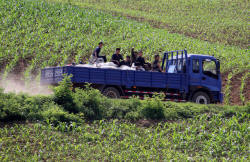|
Prices stable but
visitors see some gas stations shut in North Korea
 Send a link to a friend
Send a link to a friend
 [April 26, 2017]
By James Pearson and Ju-min Park [April 26, 2017]
By James Pearson and Ju-min Park
SEOUL
(Reuters) - Some of North Korea's state-run petrol stations are
restricting sales or appear to have closed, visitors said on Wednesday,
ahead of a U.N. Security Council meeting to discuss tougher sanctions on
the isolated state that could include curbs on oil imports.
Nevertheless, diesel and petrol prices quoted by private traders are
stable, with supply continuing uninterrupted, according to data compiled
by Reuters and interviews with North Korean defectors.
"I've noticed a few (state-owned) gas stations around town that are
closed," said Rowan Beard of Young Pioneer Tours, a China-based company
that takes Western tourists to North Korea.
"Cars now have a limit of 15 kg (about 20 liters) of fuel. It's been
like this for 15 days. Vehicles which are used for work purposes have
special exceptions," Beard told Reuters in a message from North Korea.
Another source traveling in the remote northeast area of Rason, who
asked not to be named, said that official gasoline prices there had
surged or that fuel was being rationed.
But a Reuters analysis of data collected by Daily NK, a website run by
defectors who collect prices via phone calls with North Korean fuel
traders, said the price of gasoline sold by private dealers in Pyongyang
and the northern border cities of Sinuiju and Hyesan had remained
relatively stable since late last year at around $1 per kg (about $1.34
per liter).

The price of diesel has averaged at 58 U.S. cents per kg (about 68 cents
per liter) as of April 21, compared to 68 cents at the beginning of the
year, according to the data.
Fuel is sold by weight in North Korea.
The North Korean government is likely the country's largest consumer of
fuel products, but most gasoline and diesel bought by ordinary North
Koreans is supplied by private dealers and smugglers, experts say.
U.S. Secretary of State Rex Tillerson will chair a ministerial meeting
of the U.N. Security Council on Friday to discuss tougher sanctions on
North Korea to deter it from pursuing nuclear and ballistic missiles
programs. U.S. officials have said this could include an oil embargo.
North Korea consumes relatively little oil, but curbing or cutting off
its supplies in retaliation for further nuclear or long-range missile
tests would be painful and potentially destabilizing to the regime of
Kim Jong Un.
North Korean domestic fuel prices have surged in the past over fears
that sanctions could affect supply. In March 2016, even private fuel
prices rose by over 45 percent just before U.N. sanctions were imposed
following Pyongyang's fourth nuclear test.
OTHER FACTORS
But there could be other factors at play for the current short supply at
government-owned pumps.
[to top of second column] |

North Koreans take a truck through a path amongst the fields, along
the Yalu River, in Sakchu county, North Phyongan Province, North
Korea, June 20, 2015. REUTERS/Jacky Chen/File Photo

Fuel in North Korea is often prioritized for government or military
vehicles, especially ahead of national holidays, of which there have
been two recently: April 15 to commemorate the birth anniversary of
state founder Kim Il Sung, and April 25, the 85th anniversary of the
founding of its military.
Prices also tend to rise ahead of the rice planting season,
traditionally the first week of May, defectors speaking to sources
inside North Korean markets said.
China supplies most of North Korea's fuel needs, with some coming from
Russia.
Sources familiar with China's fuel exports to North Korea said there are
no signs of China cutting back gasoline shipments, and any petrol
rationing could be caused by a shortfall of foreign currency in North
Korea as a result of China's coal embargo.
China stopped buying coal from North Korea in February as part of its
efforts to implement U.N. sanctions.
"The coal ban is fatal as it should be its top revenue earner, which
means they're running short of foreign exchange to buy gasoline," said
one source.
China supplies crude oil and diesel under aid programs to North Korea,
but Chinese suppliers normally receive advance hard cash before
deliveries of gasoline, said the source.
The stability of market prices, despite the lack of state supply, could
also be because North Korea is quietly encouraging fuel smuggling in the
fear that an official embargo may be in the works, said Kang Mi-jin, a
defector who speaks regularly to market sources inside North Korea and
reports commodity prices for Daily NK.

"When there's concern about supplies of fuel or other products, North
Korea naturally opens the door to smuggling," said Kang, who spoke to a
fuel smuggler by phone on the North Korean-Chinese border on Wednesday.
Kang said none of her sources inside North Korea had reported a
significant rise in fuel prices.
(Additional reporting by Chen Aizhu and Josephine Mason in Beijing;
Editing by Soyoung Kim and Raju Gopalakrishnan)
[© 2017 Thomson Reuters. All rights
reserved.] Copyright 2017 Reuters. All rights reserved. This material may not be published,
broadcast, rewritten or redistributed. |